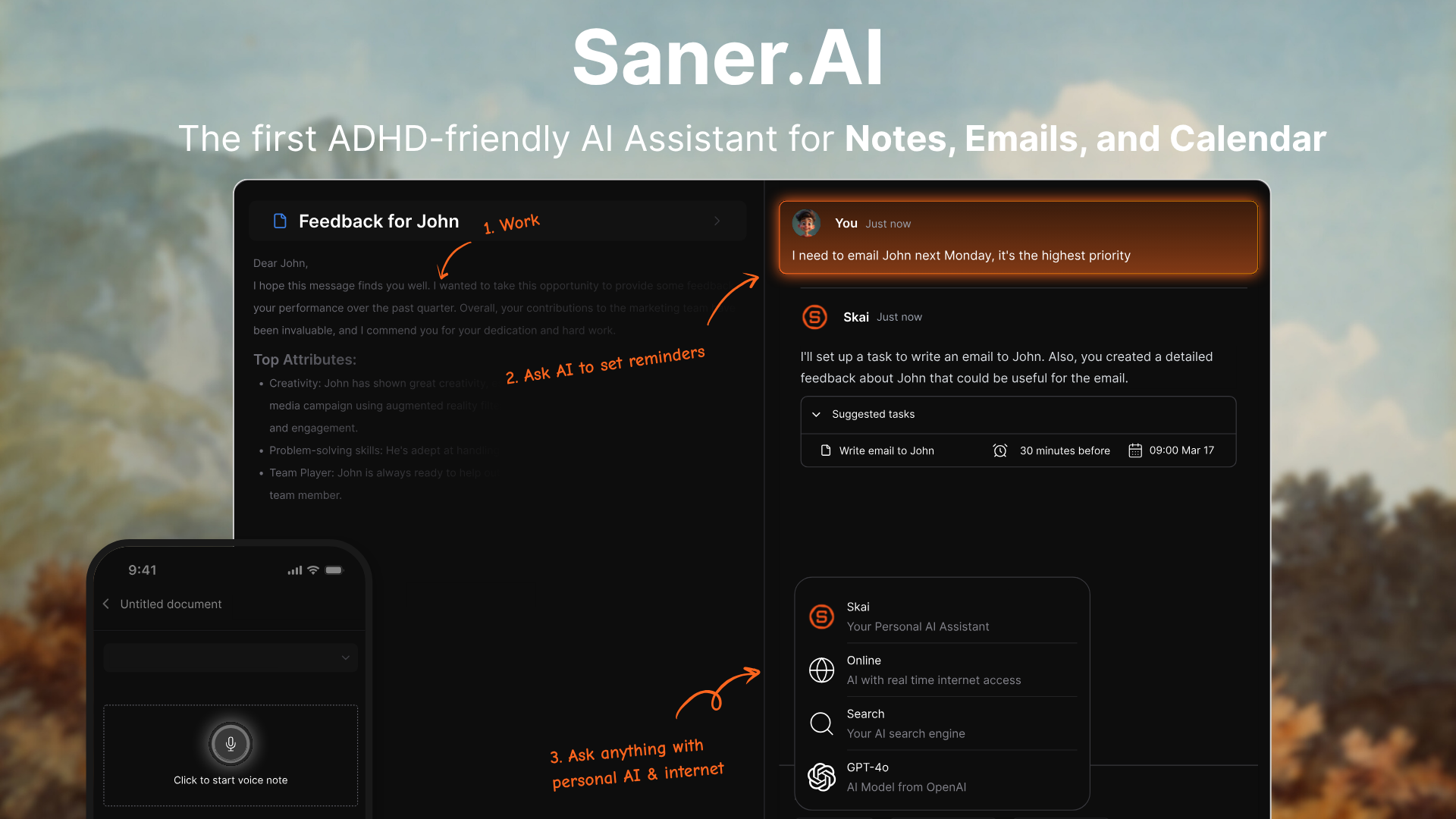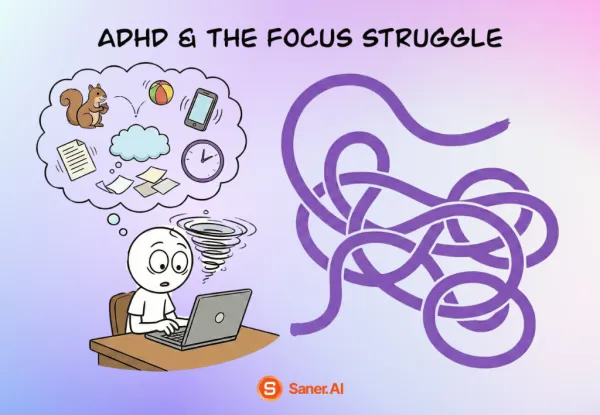We Tested 15 AI Voice Assistants. Here Are The 7 Best Apps
The Best AI Voice Assistants are: Saner.AI, ChatGPT, Siri, Pi, Alexa, Grok and Bixby

We Reviewed the 7 Best AI Voice Assistants in 2025
Remember when voice assistants were just glorified alarm clocks?
“Hey Siri, set a timer.”
“Alexa, play some lo-fi beats.”
That was cute - but 2025 voice assistants? They’re practically your second brain, enabling you to interact with artificial intelligence using your voice - to ask questions, complete tasks, or even manage your entire.
Whether you’re walking to your next meeting, cooking dinner, or AI voice assistants now help you do everything from writing emails and managing tasks to calming your anxiety.
These tools have grown rapidly. And if you haven’t explored them recently, you’re missing out on the future of work.
In this guide, we’ll break down the best AI voice assistants in 2025 based on real-world functionality, accuracy, and what they’re actually useful for.
Let’s get into it!
What Is an AI Voice Assistant?
An AI voice assistant is a tool that enables you to interact with artificial intelligence using your voice - to ask questions, complete tasks, or even manage your entire workflow.
They’ve evolved beyond robotic scripts and static responses.
Old-school voice assistants:
- Could set timers and reminders
- Needed exact phrasing
- Didn’t remember past conversations
Modern AI-powered assistants:
- Understand context (even follow-ups like “what about tomorrow?”)
- Convert your voice into tasks, summaries, and plans
- Can learn your tone, preferences, and workflows
- Work across devices and apps
🔍 Comparison: Old vs New Voice Assistants
| Feature | Old-School Assistants | Modern AI Voice Assistants |
|---|---|---|
| Context awareness | ❌ No | ✅ Yes |
| Real-time reasoning | ❌ No | ✅ Yes |
| Memory of past interactions | ❌ No | ✅ Yes |
| Multimodal input (text, voice) | ❌ No | ✅ Yes |
| Personalization | 🔸 Limited | ✅ Deeply Personalized |
| Accuracy | 😐 Basic | 🤖 High-precision LLMs |
⚙️ How Modern AI Voice Assistants Work
Today’s assistants are powered by:
- LLMs (Large Language Models): Think GPT or Claude - they understand language, context, and intent.
- ASR (Automatic Speech Recognition): Converts your voice into accurate text, even with accents or background noise.
- Contextual Memory: Some assistants (like ChatGPT Voice and Saner.AI) remember what you asked 3 days ago.
- Multimodal Inputs: They understand images, PDFs, and even your tone of voice.
🧠 Real-world examples:
- ChatGPT Voice can understand, summarize, and respond to multi-step prompts.
- Saner.AI lets you turn your voice into tasks, reminders, and notes - instantly.
- Pi.ai talks like a friendly coach - and actually listens.
What Are The Best AI Voice Assistants in 2025?
The Best AI Voice Assistants are: Saner.AI, ChatGPT, Siri, Pi, Alexa, Grok and Bixby
📊 Best AI Voice Assistants (Comparison Table)
| Name | Best For | Key Features | Platforms | Pricing* | Standout Trait |
|---|---|---|---|---|---|
| Saner.AI | Task & life management, neurodivergent workflows | Voice-to-task, universal inbox, AI chat to manage tasks | iOS, Android, Web | Freemium / paid | Converts voice into action & plans your day |
| ChatGPT Voice | General-purpose reasoning + creativity | Long memory, plugins, multimodal support | iOS/Android app (mobile) | ChatGPT Plus / enterprise tiers | Flexible, smartest generalist |
| Pi.ai | Emotional support, daily planning, chat companion | Conversational, mood checks, memory | Mobile apps | Free / premium upgrades | Best for conversational, emotionally aware assistant |
| Siri | Native iOS/macOS integration | System-level access, shortcuts, app actions | iPhone, iPad, Mac | Built-in (free) | Deep integration in Apple ecosystem |
| Alexa (Alexa+) | Smart home, ambient assistant | Routine automations, device control, voice-first | Echo, Echo Show, mobile | Freemium or subscription | Smart-home & ambient presence |
| Bixby | Samsung device ecosystem | Device control, custom commands | Samsung phones, TVs | Free (built-in) | Especially useful for Samsung users |
| Grok | Conversational, edgy personality-driven interaction | “Jokey” style, memory, chat-forward | Web, mobile | Varies by access | Personality-first voice assistant linked with X / social edge |
1. Saner.AI - The Proactive Assistant
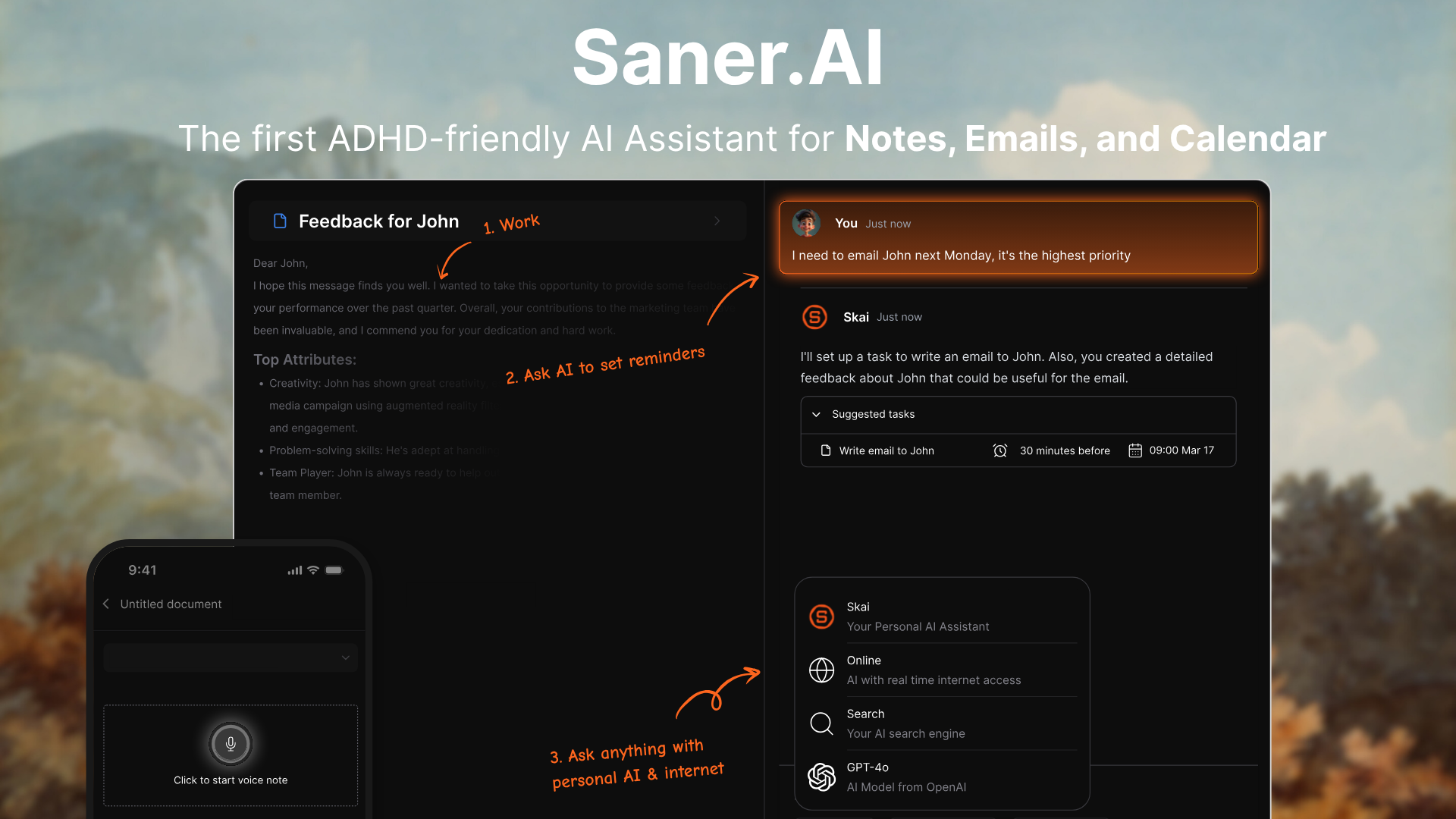
Saner.ai is a personal AI assistant built to help you stay focused and in control of your day.
Unlike traditional voice assistants like Siri or Alexa, Saner goes beyond simple commands - it helps you think, plan, and act across your notes, tasks, emails, and calendar through natural conversation.
It’s perfect for professionals who want an AI that actually understands their work context
Key features
- Voice assistant for work: You can talk to Saner naturally - ask it to plan your day, find what you said last week, or pull up tasks from your emails.
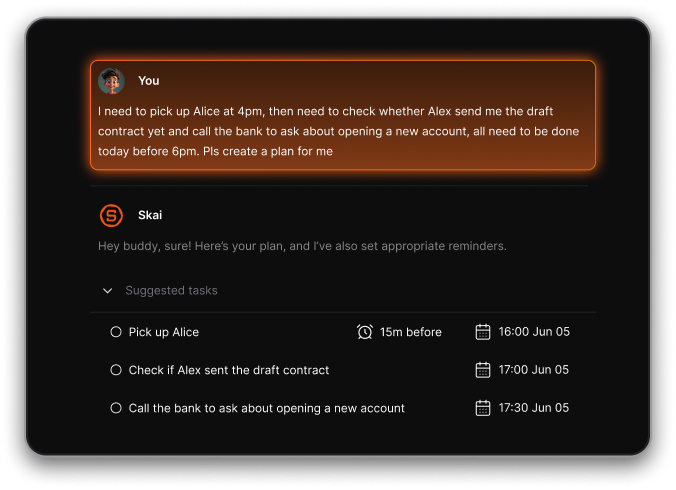
- Unified workspace: Connects your notes, tasks, emails, and calendar in one intelligent hub.
- Smart daily plan: Every morning, Saner shows you a prioritized plan with quick wins, overdue tasks, and focus reminders.
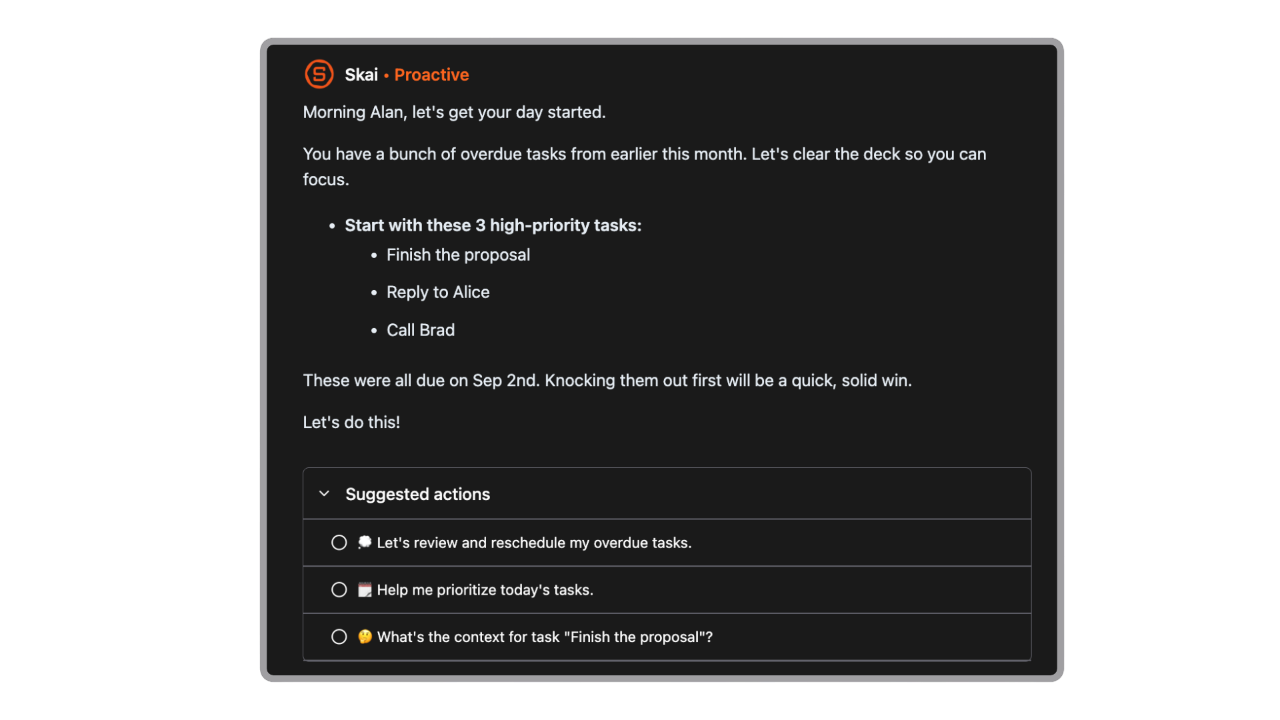
- Task extraction: Detects action items from notes or emails automatically and turns them into tasks.
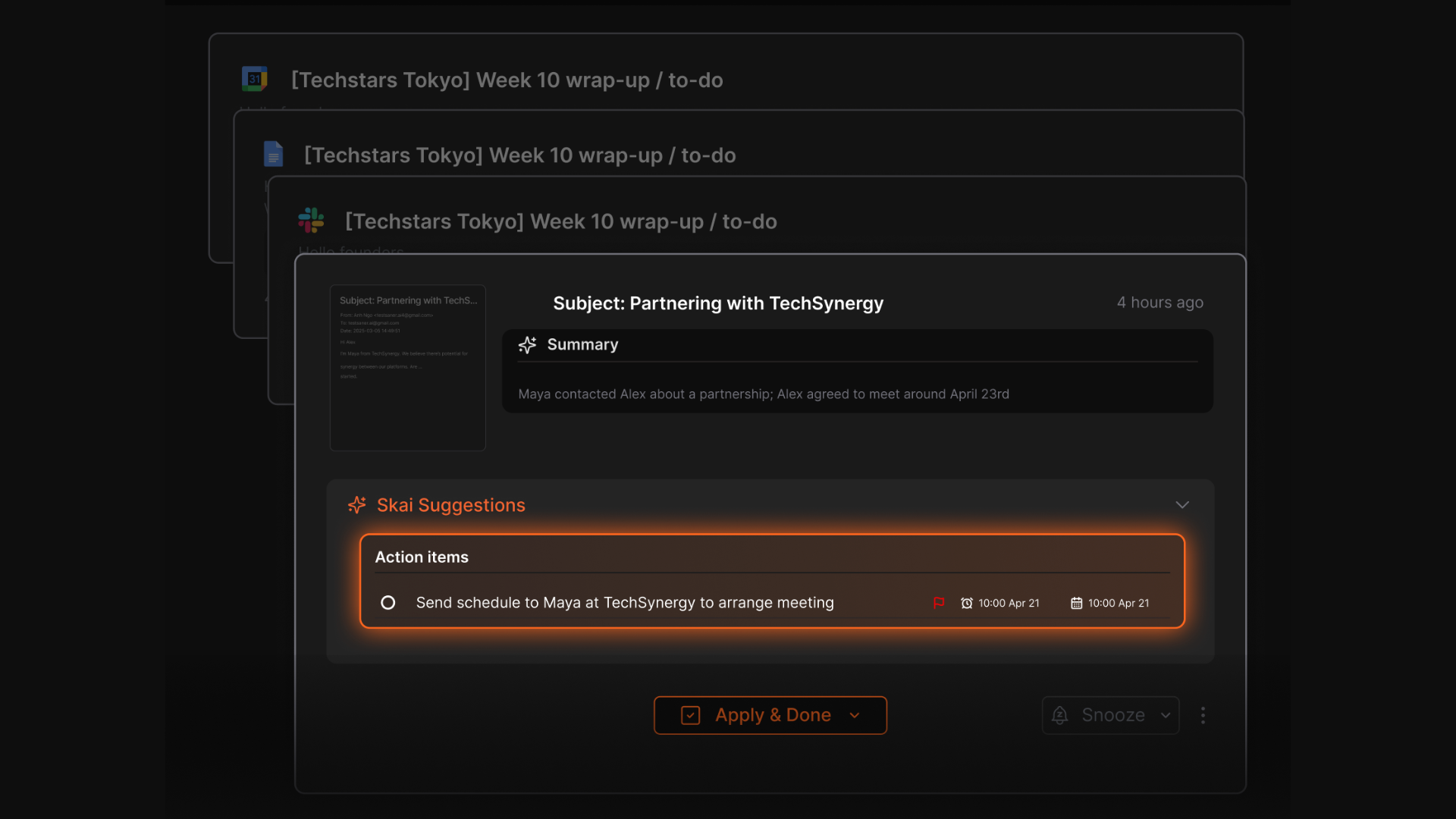
What I liked
- I love how you can just talk to it - say “Move my unfinished tasks from yesterday to today” or “What should I prioritize now?” and it instantly updates your plan.
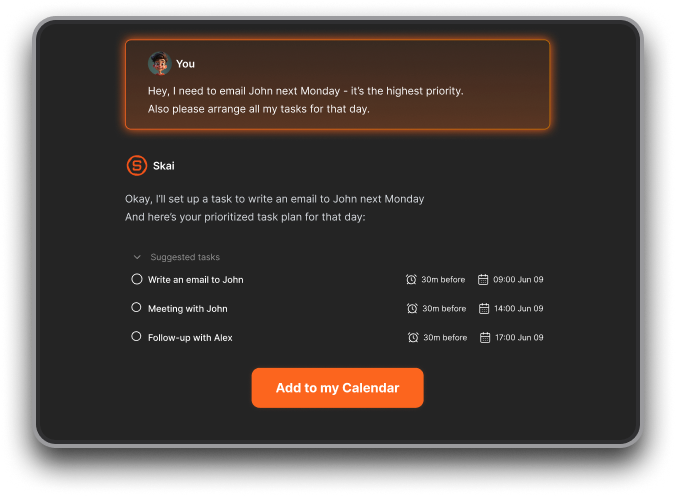
- The morning plan feature feels like having a real assistant who reminds you what matters most.
- I can just talk to the app to save notes, ask AI

Cons
- Requires internet access for full functionality
Saner.AI Reviews
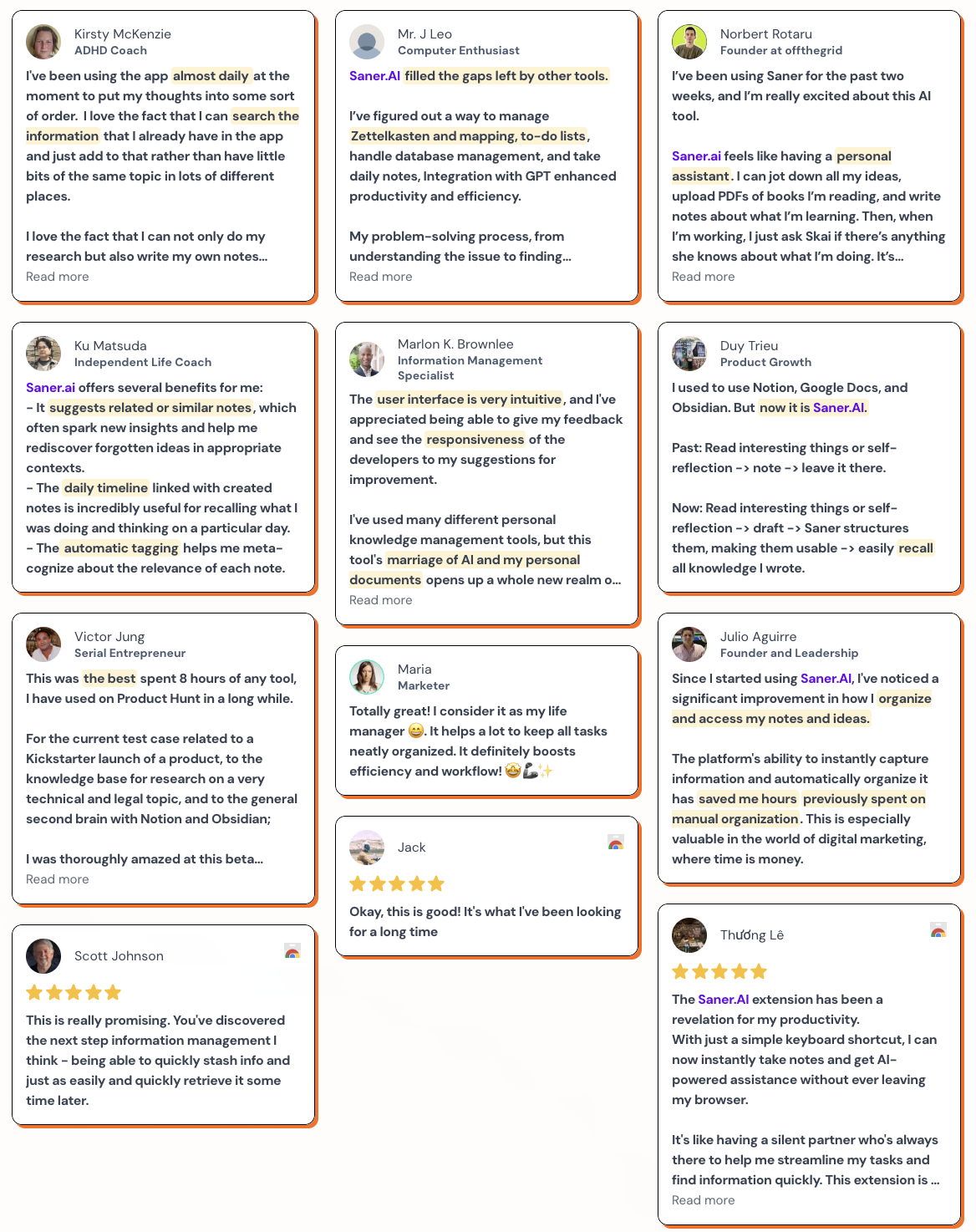
Pricing
- Free
- Starter: Monthly at $8/month, Annually at $6/month (with early user discount)
- Standard: Monthly at $16/month, Annually at $12/month (with early user discount)
Who is it suitable for?
- Entrepreneurs, researchers, and directors juggling many ideas, tasks, and meetings.
- ADHDers and neurodivergent users who prefer simplicity and less context switching.
- Busy professionals who want to plan and organize their day by simply talking to an AI.
How to start using it?
- Go to saner.ai and sign up for a free account.
- Connect your notes, calendar, and email accounts.
- Start talking to Saner
Work more efficient with your AI Voice Assistant
2. Alexa

Alexa is Amazon’s AI voice assistant, now upgraded to the new Alexa+, powered by generative AI. It still does what Alexa has always done - control your smart home, play music, answer questions - but now it’s far more conversational, proactive, and capable of handling multi-step tasks.
Key features
- Generative conversation – Alexa+ can hold natural, flowing conversations that remember context and allow topic changes without repeating yourself.
- Agentic task execution – Instead of just responding, it can do things like book restaurants, order groceries, or arrange appointments.
- Smarter home automation – Learns your patterns and can automatically trigger routines (e.g., turning off lights when you leave).
What I liked
- The conversational AI feels much more natural than older versions
- The agentic “do things for you” ability saves real time
- Great integration across Amazon’s hardware and services - Prime, Ring, Fire TV, and Echo devices work seamlessly.
What I disliked
- Still early in rollout — Alexa+ occasionally gives inaccurate or repetitive responses.
- Limited to newer Echo Show models (8, 10, 15, and 21); older devices won’t support the upgrade.
- Heavy cloud dependence
- It's just a voice assistant; there's no workspace to work on
Pricing
- Alexa+ is free for Amazon Prime members
- For non-Prime users, Alexa+ costs around $19.99/month
Suitable for
- People using Echo, Ring, or Fire devices who want a smarter home assistant
- Prime users who can access Alexa+ without paying extra
How to start
- Open your Alexa app and check if your Echo device is eligible for Alexa+ early access
- Opt in and update your device firmware
Alexa reviews (source)
3. ChatGPT

ChatGPT (with Voice) is a conversational AI assistant that lets you talk naturally instead of typing. It listens, understands context, and replies instantly — like speaking to a smart co-worker who actually remembers things.
Key features
- Voice Conversation: Talk naturally with ChatGPT using your voice and get instant spoken responses.
- Standard & Advanced Voice Modes: Choose between the expressive advanced mode or the calmer, consistent standard voice.
- Multimodal Input: Combine text, images, and speech in the same conversation
- Deep Research: The new “Deep Research” mode can browse and generate detailed, cited summaries on complex topics.
What I liked:
- The natural back-and-forth flow feels closer to a real conversation than any other AI voice assistant.
- You can interrupt or switch topics mid-sentence
- The Deep Research agent is incredibly useful for gathering and summarizing information.
What I disliked:
- Voice recognition can still miss words or stumble on heavy accents.
- The most powerful features (Deep Research, custom GPTs, advanced voice) require a paid plan.
- There’s occasional lag during busy times.
Pricing:
- Free plan: Basic text chat and limited voice access.
- Plus plan ($20/month): Full GPT-5 model access, advanced voice, and higher usage limits.
Suitable for:
- Professionals who want a voice-based productivity partner.
- Researchers or students who need quick summaries and deeper explanations.
How to start
- Sign up or log in at chat.openai.com or the ChatGPT mobile app.
- Enable Voice Mode in settings (available on Plus or higher plans).
ChatGPT Reviews (source)

4. Pi.ai

Pi (pi.ai) is a conversational AI developed by Inflection AI, designed to feel more like a thoughtful companion than a robotic assistant. You can talk to it through text or voice across web, mobile, and desktop - and it responds in a natural, human-like tone.
Key features
- Voice conversation: Talk naturally with Pi using your voice — it responds instantly with a realistic tone and inflection.
- Personality and empathy: Pi adapts its tone to sound warm, understanding, and supportive.
- Context memory: Remembers your previous chats and keeps conversations coherent over time.
What I liked
- Feels genuinely human — conversations with Pi sound kind, friendly, and emotionally aware.
- Voice interaction is smooth and expressive, not robotic.
- Completely free to use right now, so you can explore without limits.
- Works seamlessly across devices, letting you continue a chat anywhere.
What I disliked
- Not designed for productivity tasks like scheduling or managing workflows.
- Sometimes offers surface-level or vague answers to complex questions.
- Voice mode can lag slightly depending on device or network.
- Limited integrations, you can’t connect it to calendars, email, or project tools.
Pricing
- Free plan includes full text and voice chat.
Who it’s suitable for
- People who want a conversational, friendly AI for daily chats or brainstorming.
- Users seeking an emotionally intelligent voice assistant rather than a productivity bot.
How to get started
- Go to pi.ai and create a free account.
- Download the mobile app or desktop version if you prefer voice interaction.
Pi.ai reviews (source)

5. Bixby

Bixby is Samsung’s native AI voice assistant that helps you control your phone, TV, and smart home devices through voice or text. Designed for Samsung’s ecosystem, it lets you launch apps, automate routines, and even use generative AI on newer TVs. It’s ideal for users who live inside the Samsung ecosystem and want a consistent hands-free experience across devices.
Key features
- Device Control: Manage calls, messages, settings, and apps with simple voice commands.
- Quick Commands & Routines: Combine multiple actions into one phrase — say “Movie time” and it can dim lights, open Netflix, and switch TV inputs.
- Bixby Vision: Identify objects, translate text, and scan QR codes using your camera.
What I liked
- Deep integration across Samsung devices — it feels seamless if you already use Galaxy phones, TVs, or appliances.
- The Quick Commands feature is genuinely useful for chaining multiple tasks into one simple voice cue.
- You don’t need a separate subscription
What I disliked
- Still behind Google Assistant or Alexa in general knowledge and third-party integrations.
- The new AI features are limited to 2025 models
- Cannot manage your tasks, notes yet
Pricing
- Free to use on Samsung devices.
Suitable for
- Users are deeply invested in Samsung’s ecosystem (Galaxy phones, TVs, SmartThings).
- People who want voice control for device settings and home automation.
How to start
- Open Settings → Bixby / Voice Assistant on your Samsung device and enable it.
- Set up language preferences and permissions.
Bixby reviews (source)
6. Grok

Grok is an AI voice assistant with attitude, built by Elon Musk’s xAI team.
Unlike traditional assistants that play it safe, Grok combines real-time internet access with a witty, sometimes rebellious personality. It’s designed to answer questions with humor, pull live data from X (formerly Twitter), and even talk back to you in voice mode
Key features
- Real-Time Knowledge: Accesses current web and X data to stay updated with live events and trending information
- Voice Mode: Lets you talk to Grok and hear replies in real time, adding a conversational edge to your interactions
- Image and Video Generation: Includes “Grok Imagine,” which turns text into short videos or animated visuals
What I liked
- It’s fast and connected - Grok can access the latest web info instead of relying on outdated datasets
- The voice interaction feels fun and human-like, not robotic or overly polite
What I disliked
- The voice still sounds a bit mechanical compared to ChatGPT or Gemini
- Its edgy personality can occasionally produce off-tone or controversial answers
- Many voice and media features are locked behind paid plans
Pricing
- Free plan with message and generation limits
- X Premium plan at around $8/month for basic Grok access
- Premium+ plan at about $16/month for extended features
Suitable for
- People who want a voice assistant with personality and humor
- Users who rely on live web or social data
How to start
- Create or log into an X account
- Subscribe to Premium+, SuperGrok, or higher to unlock voice mode
Grok review (source)

7. Apple Siri

Siri is Apple’s built-in AI voice assistant available across iPhone, iPad, Mac, Apple Watch, and HomePod. It helps you perform everyday tasks like sending messages, setting reminders, and controlling apps or devices.
Key features
- Device Control: Toggle settings, set alarms, open apps, and adjust preferences with voice commands.
- Messaging & Calls: Send texts, make calls, and dictate notes or emails hands-free.
- Search & Information: Ask about weather, definitions, calculations, or quick facts.
- App Integration: Connects with supported third-party apps via Siri Shortcuts for automation.
What I liked
- Deep integration across Apple devices — it works smoothly across phone, watch, and computer.
- Reliable for simple daily commands like reminders or sending quick messages.
- Privacy settings are clear and easy to manage.
What I disliked
- Lacks real conversational memory; can’t handle multi-step or complex requests well.
- Heavily tied to the Apple ecosystem
- No major update yet for the new Apple Intelligence features; most are still in beta or delayed.
Pricing
- Free and included with every Apple device.
- No premium plan or upgrade required.
Suitable for
- Apple users who want a simple, reliable voice assistant for everyday use.
- People who prioritize privacy and prefer on-device processing.
How to start
- Open Settings → Siri & Search and enable “Listen for ‘Hey Siri’” or side button activation.
- Follow the on-screen steps to train Siri to your voice.
Apple Siri reviews
Conclusion: Voice Isn’t the Future - It’s Already Here
In 2025, AI voice assistants have gone from novelty to necessity. Whether you're asking for a quick reminder, brainstorming your next big move, or offloading your mental clutter into tasks, there’s now an AI assistant built for you.
- Some help you think (ChatGPT Voice).
- Some help you do (Saner.AI).
- Some help you feel heard (Pi.ai).
- And some just turn your lights off (we see you, Alexa).
The best AI voice assistant isn’t the smartest one on paper - it’s the one that fits seamlessly into your workflow, understands your context, and lets you get more done with less friction.
Because the real power of voice isn’t in talking - it’s in not having to think about what comes next.
👉 If you’re looking for an AI that turns your scattered thoughts into a clear plan - try Saner.AI. It listens like a coach and organizes like a project manager.
Stay on top of your work with the top AI Voice Assistant
FAQ: Best AI Voice Assistants in 2025
1. What is an AI Voice Assistant?
An AI voice assistant is a smart, conversational tool that helps you get things done using your voice.
You can ask it to schedule meetings, summarize notes, write emails, or even manage your daily plan - without typing a thing.
Modern AI voice assistants go beyond simple commands like “set a reminder.” They actually understand context, memory, and intent.
The best AI voice assistants in 2025 - like Saner.AI, ChatGPT, Siri, Pi, Alexa, Grok, and Bixby - can analyze information, plan tasks, and respond naturally across your devices.
2. What can AI Voice Assistants do in 2025?
Today’s assistants are more than just voice bots - they’re full-fledged productivity partners.
Here’s what the best ones can do:
- Understand context – Continue a conversation without repeating details
- Multitask – Create to-dos, send emails, or plan meetings hands-free
- Summarize and recall – Retrieve key points from notes, documents, or past conversations
- Personalized planning – Suggest what to focus on next based on your priorities
- Cross-device sync – Work seamlessly across phones, laptops, and smart speakers
Tools like Saner.AI even merge your notes, emails, and tasks into one conversational workspace.
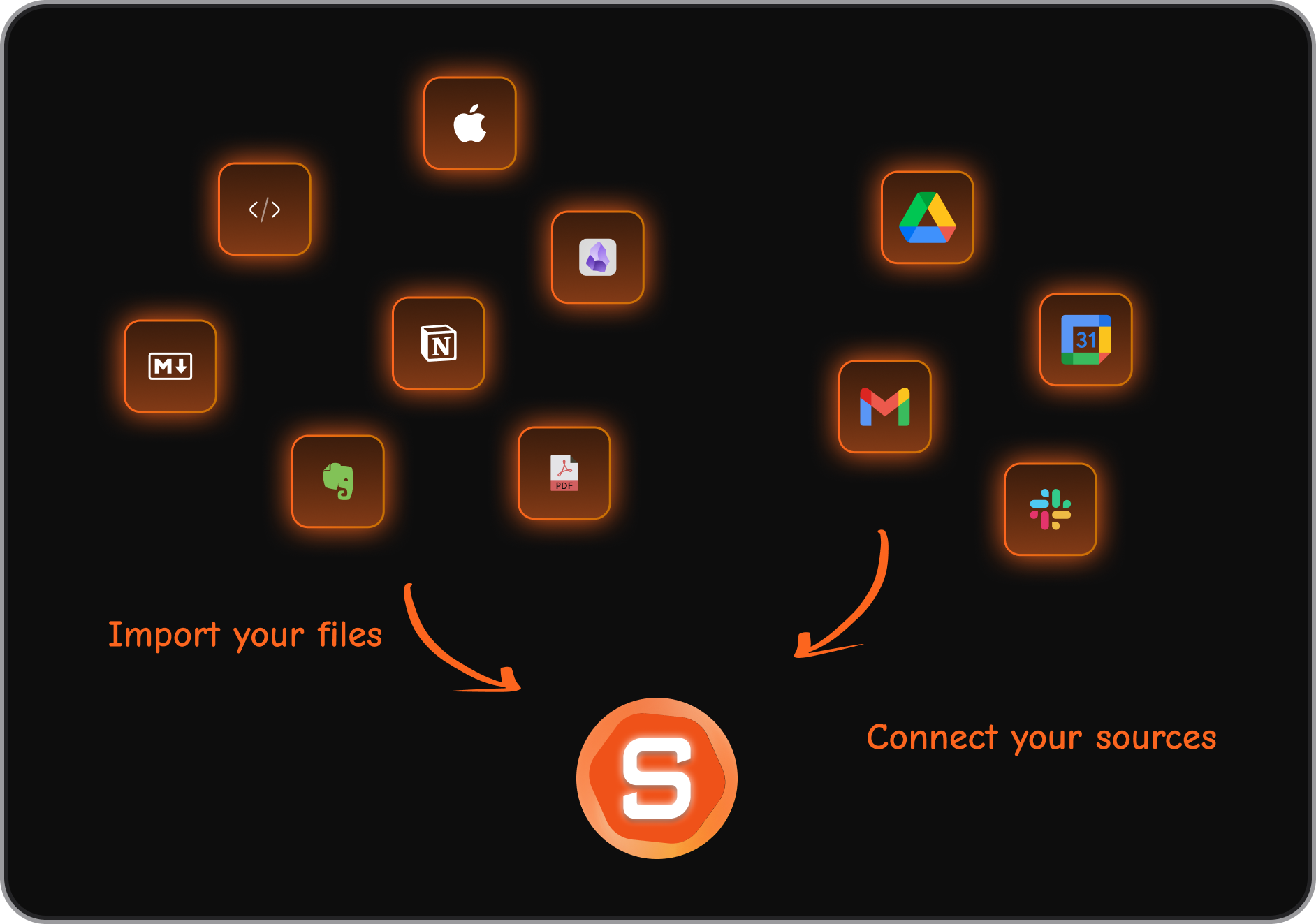
3. Which are the best AI Voice Assistants right now?
Here’s a quick overview of the top picks for 2025:
- Saner.AI - A personal AI assistant that connects your notes, emails, and calendar. You can talk to it naturally to organize your day or recall information.
- ChatGPT Voice – Ideal for brainstorming, creative writing, and research conversations.
- Siri – Great for Apple users who want deep system integration and quick voice control.
- Pi – Focused on emotional support and natural, empathetic dialogue.
- Alexa – Best for smart home automation and hands-free routines.
- Grok – Geared toward real-time information and witty conversational tone.
- Bixby – Best for Samsung users who want smart device control and voice shortcuts.
4. What is the best AI Voice Assistant for productivity?
If you want a voice assistant that goes beyond answering questions, Saner.AI stands out.
It doesn’t just talk - it helps you follow through. You can say:
- “Remind me to send the report after my meeting.”
- “What did I promise in yesterday’s call?”
- “Plan my day around my deadlines.”
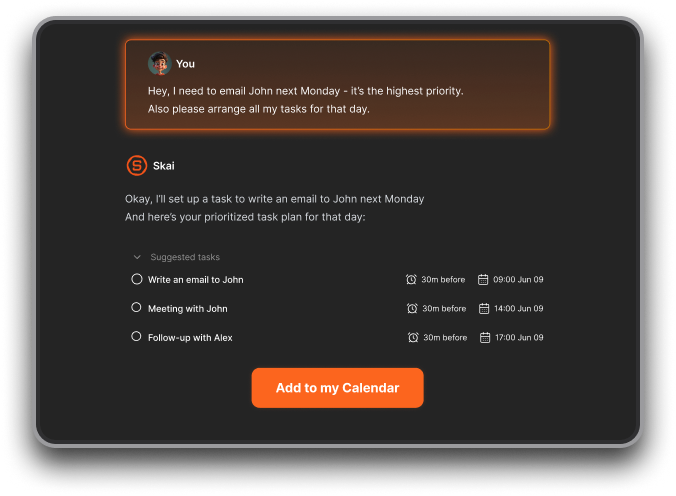
Saner turns your spoken words into tasks, connects them to your calendar, and helps you prioritize automatically.
5. Which AI Voice Assistant is best for iPhone users?
- Siri is still the go-to for Apple users - it’s tightly integrated with iOS, shortcuts, and native apps.
- However, if you want smarter, conversational capabilities, ChatGPT Voice and Saner.AI’s voice input offer a more natural experience and deeper task understanding.
6. Which AI Voice Assistant works best for Android users?
- Bixby is native to Samsung devices and offers deep integration, while Alexa and ChatGPT Voice run smoothly across Android.
- For a productivity-focused workflow, Saner.AI offers AI-driven task management that syncs with Google Calendar and email.
7. What’s the most human-like AI Voice Assistant?
- Pi AI and ChatGPT Voice lead in natural, empathetic conversations.
They understand tone, emotional nuance, and context - making them feel more like talking to a person than a robot. - Saner.AI, while focused on productivity, balances warmth and function - it remembers your past notes, tasks, and preferences in natural conversation.
8. Are there free AI Voice Assistants?
Yes, most top tools offer free tiers:
- Saner.AI – Free plan with AI task reminders, natural voice input, and daily summaries
- ChatGPT – Free access with GPT-3.5 voice
- Pi – Fully free for personal conversations
- Siri, Alexa, Bixby – Free and built into devices
- Grok – Available via X Premium+ subscription
9. Can AI Voice Assistants understand different languages and accents?
Yes. Modern assistants are multilingual and accent-aware.
Siri, Alexa, and Bixby support dozens of languages natively, while ChatGPT Voice and Saner.AI handle multilingual input with high accuracy using contextual understanding.
10. Which AI Voice Assistant is best for entrepreneurs or busy professionals?
Saner.AI is built for fast-moving people juggling multiple priorities.
It helps you brain-dump ideas, organize follow-ups, and turn chaos into structure - just by talking.
You can say:
“Summarize my investor notes and remind me to follow up next week.”
And Saner does the rest.
11. Which AI Voice Assistant is best for managing your smart home?
If your goal is automation, Alexa and Bixby are top picks.
They integrate with lights, thermostats, speakers, and appliances.
Say “Goodnight,” and your assistant can lock the doors, turn off lights, and lower the AC.
12. Which AI Voice Assistant is most private or secure?
Privacy varies by ecosystem:
- Saner.AI focuses on secure, private data handling
- ChatGPT allows you to control conversation history and data sharing.
- Siri, Bixby, and Alexa use cloud-based processing but now offer improved privacy controls in settings.
13. Can AI Voice Assistants help with ADHD or focus issues?
Yes. Voice input helps ADHD users reduce friction between thought and action.
Saner.AI is particularly effective - it turns your spontaneous ideas into reminders, plans, or tasks instantly.
Instead of juggling 10 apps, you just talk, and it organizes your thoughts for you.
14. Do AI Voice Assistants integrate with calendars and notes?
Most modern assistants do:
- Saner.AI – Deeply integrates notes, emails, and calendar in one place.
- Siri and Bixby – Sync with native calendars and reminders.
- ChatGPT Voice – Can connect to external apps via plug-ins or extensions.
15. How do I choose the best AI Voice Assistant for me?
It depends on your goal:
- For productivity and focus → Saner.AI
- For natural, emotional conversation → Pi
- For smart home automation → Alexa or Bixby
- For writing and creativity → ChatGPT
- For everyday convenience → Siri
- For real-time information → Grok
Start with one that matches your main pain point - then explore integrations as your needs grow.
16. What’s next for AI Voice Assistants in 2025 and beyond?
- The next wave of assistants will act more like thinking partners - able to recall your past decisions, anticipate your needs, and execute tasks autonomously.
- Expect voice AI tools like Saner.AI and ChatGPT Voice to blend planning, reasoning, and execution into a single seamless experience.
17. Can marketers or social media managers use AI Voice Assistants?
Absolutely. ChatGPT Voice and Saner.AI make campaign planning and content creation way faster.
You can say:
- “Write a LinkedIn post about our new feature.”
- “Summarize engagement data for last week.”
- “Remind me to follow up with our designer tomorrow."
Saner keeps your calendar, notes, and creative drafts in sync - so nothing falls through the cracks.
18. What about AI Voice Assistants for journalists or podcasters?
Saner.AI and ChatGPT Voice are perfect for fast-paced media work.
You can record interview notes verbally, then ask:
- “Summarize my last interview.”
- “Pull quotes from the conversation with Dr. Lee.”
- “Turn this transcript into a 2-minute intro.”
It saves hours of manual work while keeping your storytelling flow intact.
19. Can AI Voice Assistants help during travel or on-the-go work?
Yes. Siri, Alexa, and Saner.AI are ideal for travelers.
You can manage bookings, track flights, or capture ideas mid-journey.
Example: “Remind me to check in for my flight tomorrow at 3 PM” or “List restaurants near my hotel.”
Saner.AI even helps you organize trip notes and receipts automatically.
20. Is there an AI Voice Assistant for everyday life management?
Yes - Alexa, Siri, and Saner.AI make daily routines effortless.
They can:
- Add grocery items to your shopping list
- Remind you about bills or appointments
- Recap your day with quick voice summaries
Saner adds context awareness - it learns your routines and gently reminds you what matters most each morning.
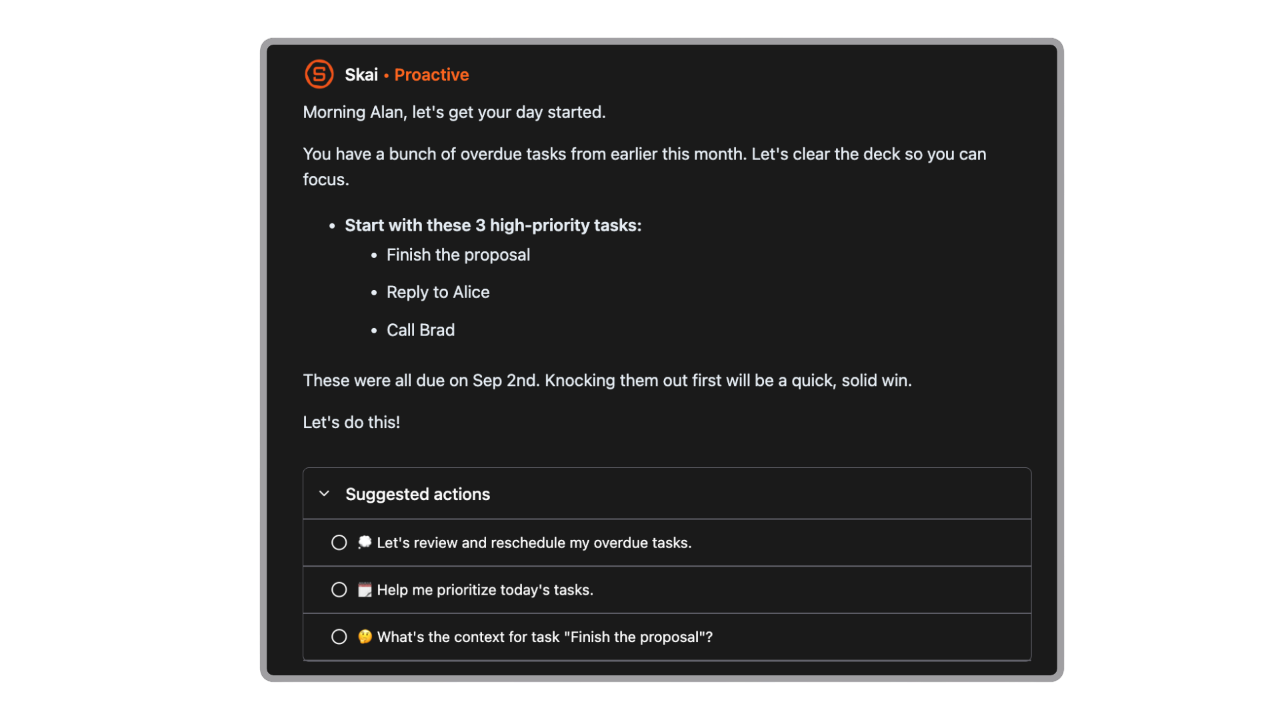
21. What’s the best AI Voice Assistant for mental health or mindfulness?
Pi and Saner.AI help with self-reflection and emotional clarity.
You can talk through your thoughts, and Pi responds with empathy, while Saner transforms insights into gentle, actionable habits like:
- “Remind me to take a 5-minute break at 4 PM.”
- “Summarize my journal from this week.”
It’s like having both a calm listener and a mindful coach in your pocket.
22. Which AI Voice Assistant is best for HR or recruiters?
Saner.AI and ChatGPT Voice simplify hiring workflows.
You can say:
- “Summarize candidate interviews.”
- “Remind me to send feedback to the design applicant.”
They also help draft outreach messages and keep all notes searchable by name or role.
23. What’s the best AI Voice Assistant for project managers?
Saner.AI keeps track of deadlines, meeting notes, and team updates.
Ask:
- “What’s still pending from yesterday’s sprint?”
- “Summarize the action items from the client call.”
Unlike typical task tools, Saner understands your context, not just your calendar.
24. Can AI Voice Assistants help lawyers or consultants?
Yes. Professionals who live on calls and documents benefit from Saner.AI and ChatGPT Voice.
They can dictate case notes, generate summaries, or plan follow-ups.
Example: “Summarize my meeting with Acme Corp and set a reminder for the next review.”
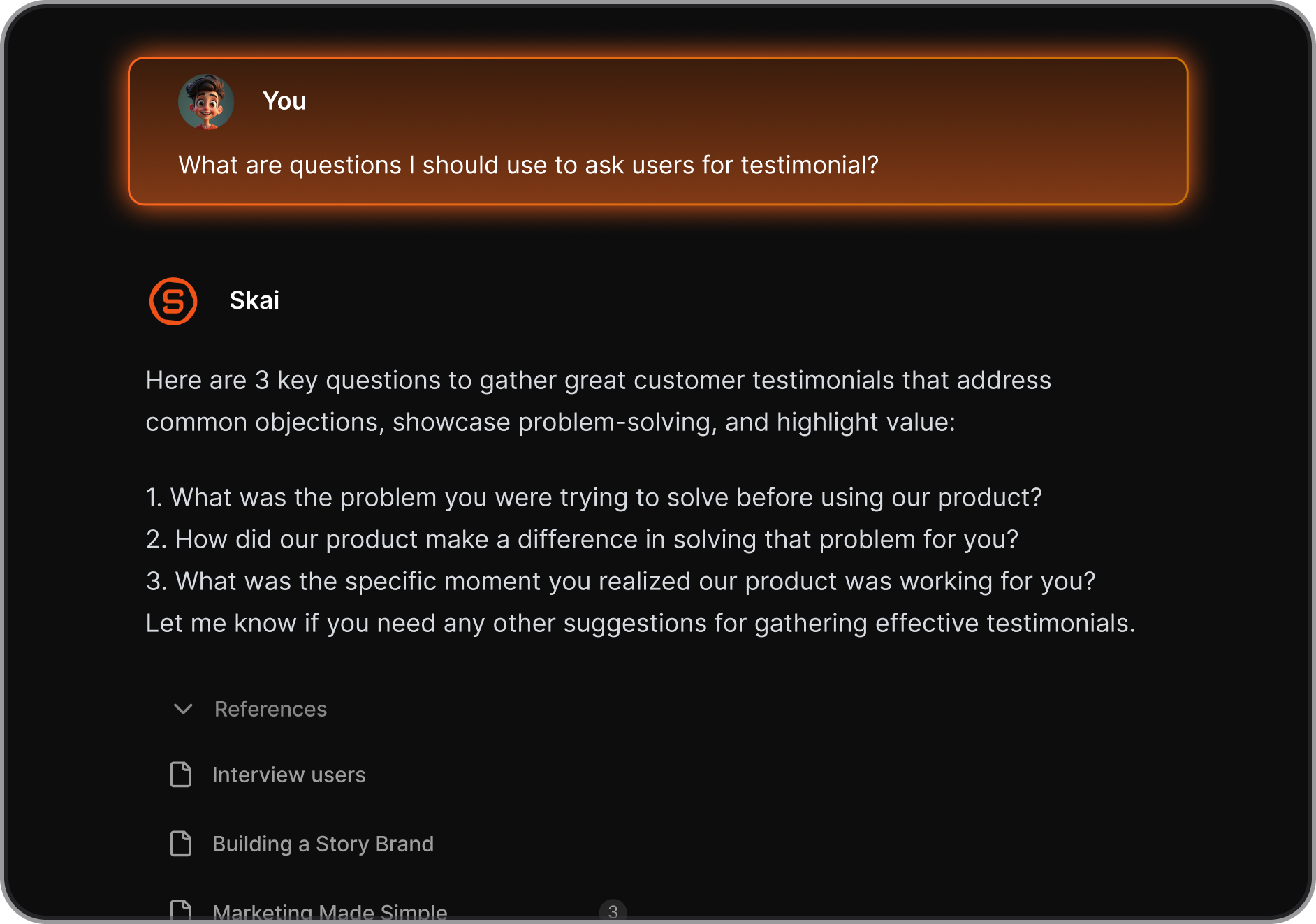
It saves time and reduces the mental overhead of paperwork.
25. What’s the best AI Voice Assistant for finance professionals or accountants?
Saner.AI and Siri can track reminders, summarize client updates, and manage repetitive tasks.
You can say: “Remind me to send Q4 invoices on Friday,” or “Summarize this spreadsheet summary email.”
Saner also links conversations and notes for an audit-friendly organization.
26. Can AI Voice Assistants help developers or tech leads?
,
Yes - ChatGPT Voice, Grok, and Saner.AI help with daily stand-ups and project context.
Ask:
- “Summarize our bug-fix notes.”
- “What’s the next deployment step?”
Grok adds quick real-time info from X, while Saner organizes meeting logs and priorities into actionable lists.
27. What’s the best AI Voice Assistant for creatives and designers?
Saner.AI and ChatGPT Voice are perfect brainstorming partners.
You can describe visual ideas, get quick feedback, or outline content pipelines hands-free.
Example: “Draft creative brief from my last brainstorm note.”
Saner keeps all your creative thoughts searchable and connected.
28. Can AI Voice Assistants help researchers or analysts?
Definitely. Saner.AI and ChatGPT Voice make research synthesis faster.
You can say: “Summarize this paper,” “List insights from my notes on climate policy,” or “Remind me to fact-check the sources.”
Saner connects data across notes and highlights relationships you might miss.
29. Is there an AI Voice Assistant for small-business owners?
Yes - Saner.AI is like having a personal operations assistant.
You can talk through orders, clients, or marketing updates, and it’ll organize and remind you automatically.
Example: “List all pending client payments” or “Draft invoice follow-up email.”
30. Can AI Voice Assistants help event planners or coordinators?
Absolutely. Saner.AI and Siri simplify logistics.
Say: “Remind me to confirm the venue on Tuesday,” or “List all vendors for the launch event.”
Saner links your emails, notes, and tasks together - so planning feels effortless.
Stay on top of your work and life

